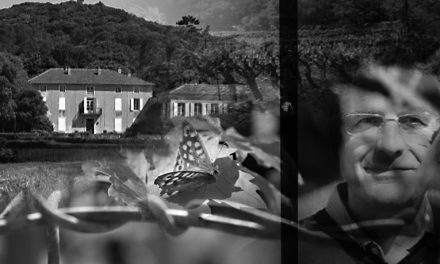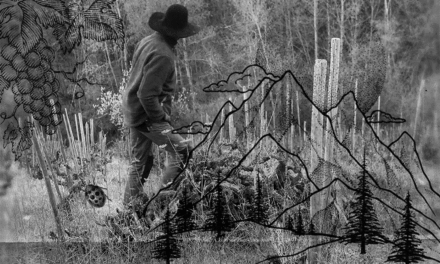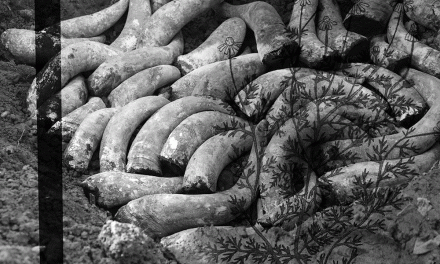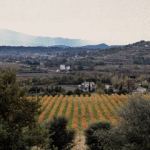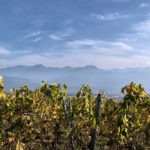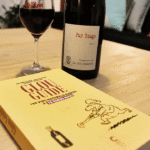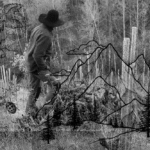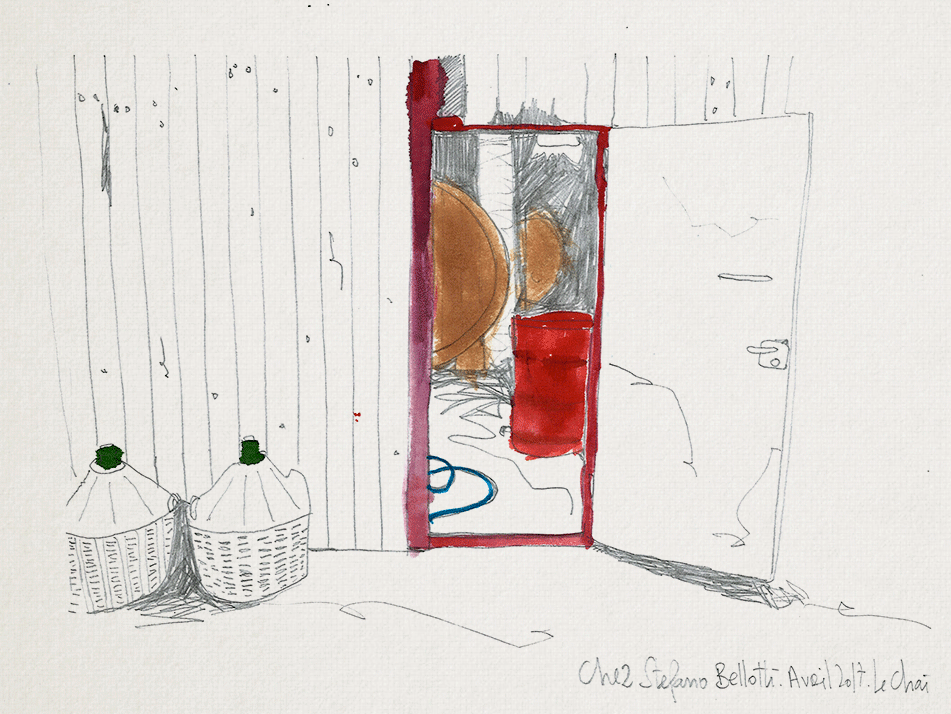
Suivre des règles préétablies dans
un environnement vivant ne peut pas fonctionner sur le long terme.
Stefano Bellotti,
Cascina Degli Ulivi
Au printemps dernier, j’ai eu l’occasion d’aller rendre visite à quelques vignerons dont les vins avaient piqué ma curiosité l’année passée : une belle opportunité de partir à la rencontre de personnages passionnés et passionnants.
La sensibilité du vivant selon
Stefano Bellotti
En route vers Sienne, j’ai fait une halte dans le Piémont, chez Stefano Bellotti, un des pères de la viticulture biodynamique en Italie et producteur de vins TRÈS natures !
Depuis Novi Ligure, les petites routes sinueuses qui mènent à la Cascina Degli Ulivi, le domaine de Stefano, vous plongent dans un écrin de verdure ensoleillé au sein duquel la ferme est installée depuis si longtemps que tout y semble préservé, comme dans un rêve où la vie exprimerait tout son potentiel, sans entrave. Un bel exemple de biodiversité : la plupart des animaux évoluent en toute liberté sur le domaine, tels les canards se promenant en file indienne sur le toit de la ferme, les oies déambulant en troupes bien organisées dans les allées entre le gîte et la ferme, ou les poules picorant dans la vigne. De magnifiques glycines poussent également un peu partout, dans les arbres, sur les poteaux électriques, ponctuant le lieu du violet lumineux de leurs grappes fleuries.
En 1977, Stefano Bellotti n’avait que 18 ans quand il reprit la ferme familiale qui ne comportait qu’un hectare de vignes. Aujourd’hui, la ferme totalise une vingtaine d’hectares de vignes, une dizaine de blé et de fourrage, mais également un immense potager et des arbres fruitiers ainsi que des ruches présentes un peu partout sur le domaine.
Stefano Bellotti reste à l’écoute de l’ensemble de ses cultures et s’adapte toujours à leurs besoins : « Suivre des règles préétablies dans un environnement vivant ne peut pas fonctionner sur le long terme. Lorsque vous écoutez les plantes, c’est incroyable ce qu’elles vous donnent en retour. »
A la vigne, Stefano applique bien évidemment les principes de la biodynamie. Il y plante également des engrais verts qu’il coupe et laisse se décomposer à même le sol une fois fanés. Hormis ces engrais verts, l’herbe entre les rangs n’est jamais coupée tout comme la vigne n’est jamais taillée afin qu’elle trouve elle-même son équilibre. L’énergie de la vigne étant répartie dans tout le cep, la taille aurait une influence sur la qualité du raisin ainsi que sur la capacité de la vigne à lutter contre les maladies.
A la Cascina Degli Ulivi, au dîner comme au petit-déjeuner, la table d’hôte est un vrai bonheur. Les produits cuisinés sont essentiellement issus de la ferme conduite en biodynamie. Les pains frais sont un régal (il y a un four à pain juste à côté du gîte !). Tous les plats révèlent le goût de leur terroir, le chef s’effaçant devant tant de richesse gustative, il cuisine simplement tous ces beaux produits – ah ! les antipastis ! ah ! les ravioles aux asperges sauvages !
De plus, tous les vins du domaine sont proposés à la carte et sur plusieurs millésimes : le bonheur ! Permettant de découvrir toutes les jolies nuances de la douzaine de cuvées proposées par Stefano. Ses vins sont à l’image de sa ferme : parfois rustiques, souvent créatifs et toujours empreints de liberté. S’il s’écoutait, il ferait un vin par rang de chaque parcelle car il estime que les caractéristiques du raisin sont différentes au sein d’une même vigne !
Je suis reparti enchanté de cette halte, nourri de tous ces goûts savoureux qui font du bien au corps et à l’esprit et qui, fidèles à leur terroir, s’offrent à vous comme une marque de respect et de générosité envers le visiteur de passage.
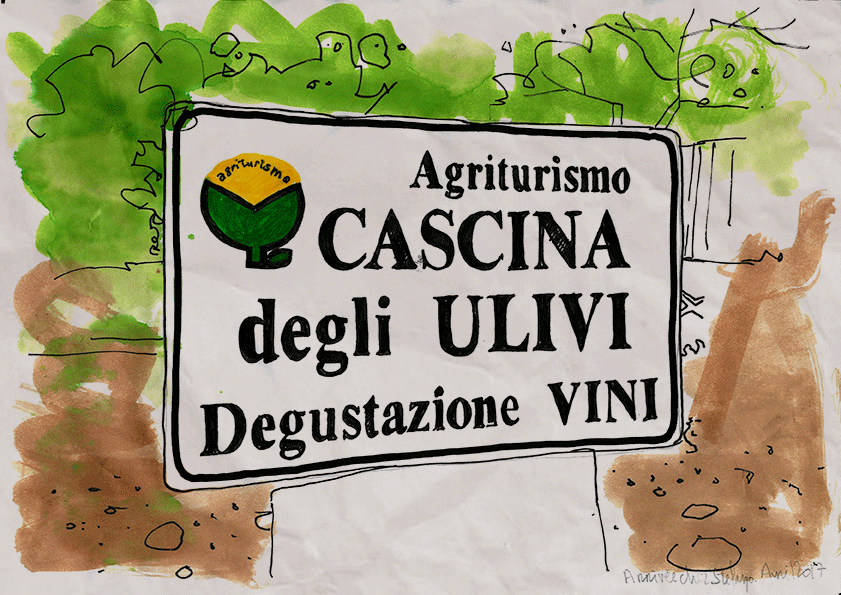
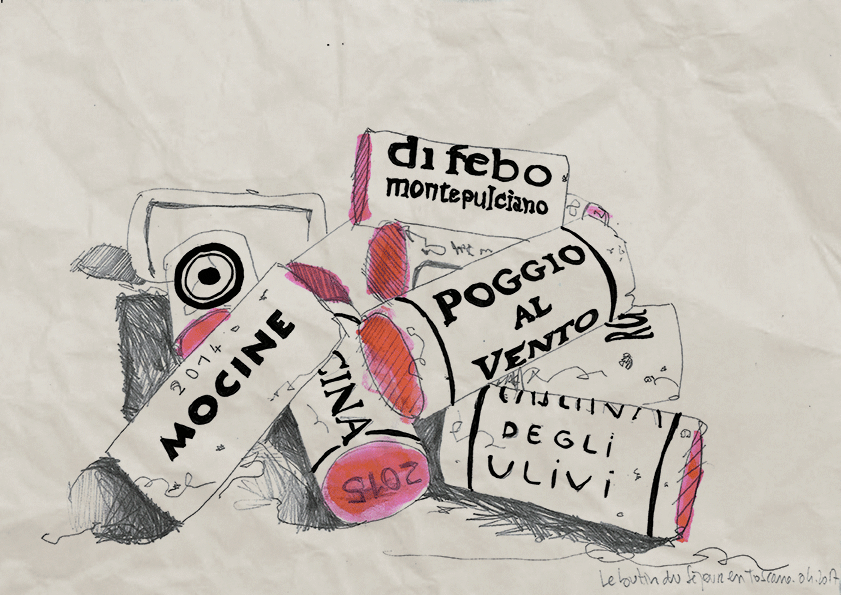
Le respect des variétés anciennes selon l’Azienda Agricola Mocine
En Toscane, je suis tout d’abord parti à la rencontre de Valerio Brighi à l’Azienda Agricola Mocine, un domaine niché au cœur des Crete Senesi, un paysage d’une beauté fascinante où les reliefs évoluent tout au long de la journée sous la magnifique lumière toscane. Le jour de notre venue, rafraîchis par le vent du nord, Francesco, le maître de chais, nous a accueilli au caveau.
L’Azienda Agricola Mocine est un domaine tout récent dont le premier millésime remonte à 2007. Il y a tout juste dix ans, le choix fut dès le départ axé sur la production de vins de qualité issus de cépages autochtones, avec tris sévères et maturité optimale, le tout conduit en bio et sans additif de synthèse. Aujourd’hui, le domaine comptabilise 5 hectares. Le souhait est de conserver cette superficie pour assurer la qualité des vins et accompagner au mieux chaque millésime pour qu’il révèle son potentiel aromatique.
Environ 25,000 bouteilles sortent chaque année de la cave, réparties sur 4 cuvées rouges et un blanc. Quatre cépages sont principalement à l’origine de ces cuvées : Sangiovese, Colorino, Barsaglina et Foglia Tonda.
Les cuvées Santa Marta et Mocine sont élevées en cuve inox et les deux cuvées plus haut de gamme passent jusqu’à 3 années sous bois : Otto Rintocchi et S’Indora (une cuvée rare, 500 à 700 bouteilles, issue à 100% de Foglia Tonda – cépage autochtone qui donne des vins élégants au tanins bien fondus).
La cuvée Mocine reste le vin emblématique du domaine et toute l’attention est portée sur les raisins de Sangiovese qui la constituent à 60%. Les autres cuvées sont assemblées dans un second temps selon le travail effectué sur Mocine ainsi que les raisins restants.
L’Azienda Agricola Mocine fait partie d’une coopérative agricole établie sur plusieurs régions d’Italie en partenariat avec la ferme Santa Marta. Le travail de la coopérative est attentif à la biodiversité et aux variétés anciennes, plus résistantes aux maladies. Ainsi, l’exploitation compte près de 100 hectares de riz au sud de Milan, produits selon des méthodes culturales anciennes afin de conserver les valeurs nutritives des riz Carnaroli et Arborio (dont les Integrale, des riz complets à tomber par terre pour des risottos savoureux !). La coopérative produit également en Toscane une l’huile d’olive, douce et parfumée (5 000 bouteilles) ainsi que des produits dérivés du lait en Lombardie (crème, yaourts et fromages affinés tels que le Grana Padana).
A noter enfin que l’ensemble du personnel qualifié de la coopérative agricole travaille en étroite collaboration avec le Lab Monitoraggio e Conservazione delle piante (en charge de la conservation des variétés agricoles anciennes et autochtones) de l’Université Bologne. Les membres de la coopérative interviennent également à l’université et travaillent avec les étudiants dans le cadre de leur cursus.
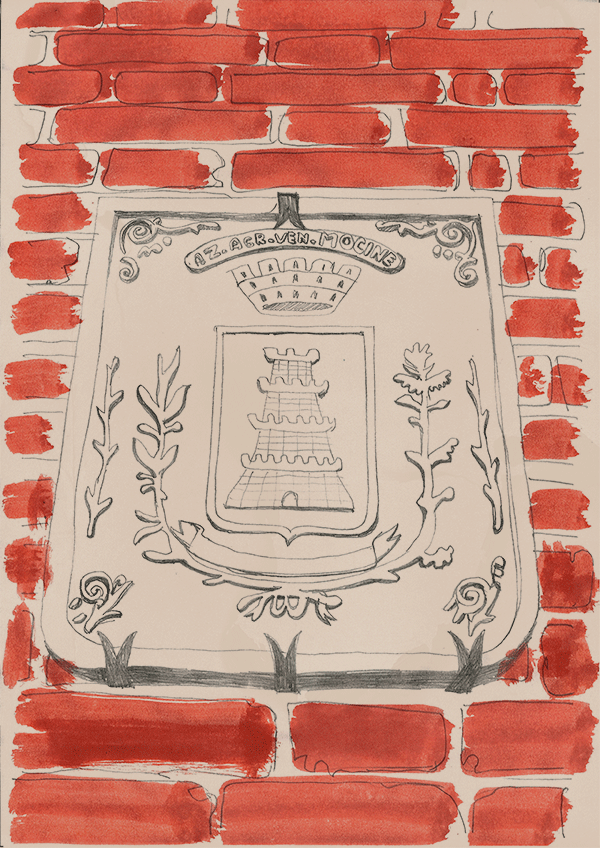
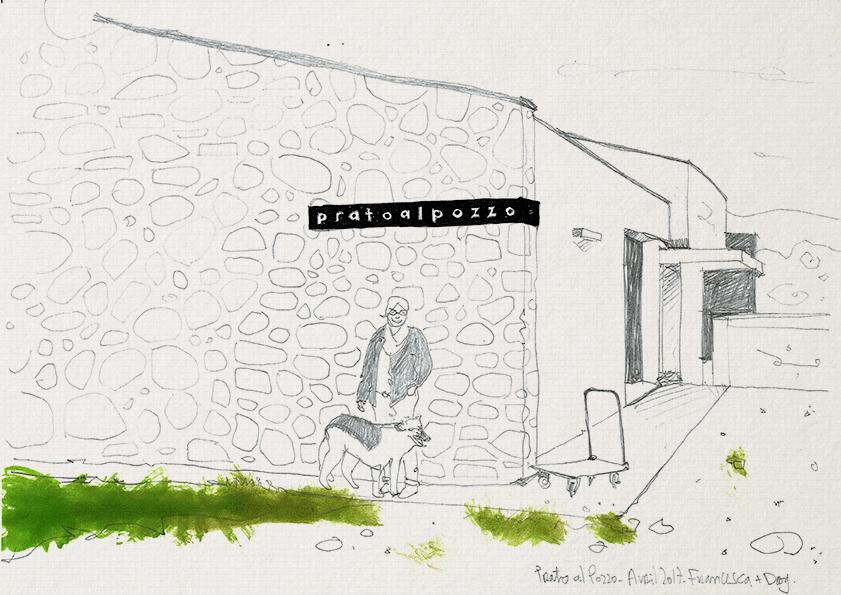
D’où l’importance des petits domaines viticoles selon Francesca Quiriconi
Le jour suivant, ce fut avec un immense plaisir que je suis parti à la rencontre de Francesca Quiriconi dont j’apprécie tellement les vins. Nous avions rendez-vous au domaine, Podere Prato al Pozzo, crée en 2003, à Cinigiano sur les contreforts du Monte Amiata qui culmine à 1700 mètres qui était enneigé lors de notre visite en avril dernier, un mois décidément exceptionnellement frais pour la Toscane !
Le domaine Prata al Pozzo s’étend sur 1,5 hectares – un nano domaine à l’échelle de l’appelation Montecucco DOC qui s’étend sur 500 hectares – principalement planté de Sangiovese, de Cabernet Sauvignon et de Vermentino complétés par la culture d’oliviers pour produire une huile d’olive haute-couture.
Francesca a nous fait visiter son chai récemment construit dont la salle de dégustation est un balcon sur la magnifique campagne toscane, plantée d’oliviers et de vignes. Un lieu magique et apaisant pour déguster les vins du domaine dans de bonnes conditions.
Les trois cuvées du domaine sont un Montecucco DOC (Arpagone), un Maremma Toscana blanc (Piede Rosso) et un Maremma Toscana blanc (Vermentino). Le Montecucco est à majorité de Sangiovese complété par 10% de Cabernet Sauvignon (voir dégustation ici). La vinification de Piede Rosso uniquement à base de Cabernet Sauvignon est plutôt intéressante, avec une belle cohérence entre le nez et la bouche où l’on retrouve des arômes de baies rouges, d’épices et des notes balsamiques. Comparé à Arpagone, ce vin m’a paru plus aérien, plus international aussi.
Ici, 10,000 bouteilles sortent chaque année de la cave dont 3,000 de Maremma Toscana. Francesca nous raconta une anecdote à ce propos : des acheteurs chinois lui rendirent visite par l’intermédiaire du consul chinois en Italie. Ils ne parlaient pas un mot d’italien et ne dirent d’ailleurs pas grand-chose durant la dégustation lors de leur visite du domaine. Ils partirent comme ils étaient venus, finalement assez peu curieux. Puis, pas de nouvelles pendant plusieurs mois jusqu’à leur retour en Chine où ils lui indiquèrent qu’ils souhaitaient acquérir l’équivalent de la moitié de la production ! Bien évidemment Francesca refusa, un tel engagement ne pouvant être pris avec un seul et nouveau client pour un domaine de cette taille.
Aujourd’hui, le domaine est conduit selon les principes de l’agriculture biologique. Cependant, Francesca a fait le choix de ne pas prendre de certification pour son domaine car cela lui coûterait bien trop cher pour un domaine de cette superficie, mais également parce que le processus de certification biologique en Italie semble en plein marasme et les contrôles y seraient peu regardants. Elle a donc fait le choix de la rigueur en proposant par conviction des vins sans intrant et se tournera bientôt vers la biodynamie car le climat de la région y est particulièrement propice. Par contre, elle travaillera pour obtenir la certification Demeter, nettement plus sérieuse selon elle, et bénéficiant d’une image qualitative de par le monde.
Enfin, nous avons abordé la question des appellations, une problématique locale qui rejoint l’actualité française. En tant que néo-vigneronne, Francesca se pose beaucoup de question sur les déséquilibres au sein des appellations où elle produit ses vins – DOC Montecucco et Maremma Toscana. En effet, il est difficile d’y promouvoir le travail de petits viticulteurs qui cherchent l’expression d’un terroir au travers d’un travail exigeant et qualitatif, essayant de vendre leur production à des prix cohérents pendant que des supers domaines (souvent danseuses de capitaines d’industrie) de plus de 100 ha bradent leurs vins, sous ces mêmes appellations, à la grande distribution. De plus, les consortiums des vins locaux étant très souvent présidés par les propriétaires de ces mêmes grands domaines, comment faire falloir le travail de petites exploitations ainsi que le terroir dans l’attribution des AOC ?
Cascina degli Ulivi
Agriturismo Azienda Agricola
Strada della Mazzola 14
15067 Novi Ligure (AL)
Tel. +39 0143 744 598
Fax. + 39 0143 510 155
info@cascinadegliulivi.it
Azienda Agricola Mocine
Sede di Asciano Chiusure
53041 Asciano (SI)
Tel. et fax + 39 0577 707 075
info@mocine.it

